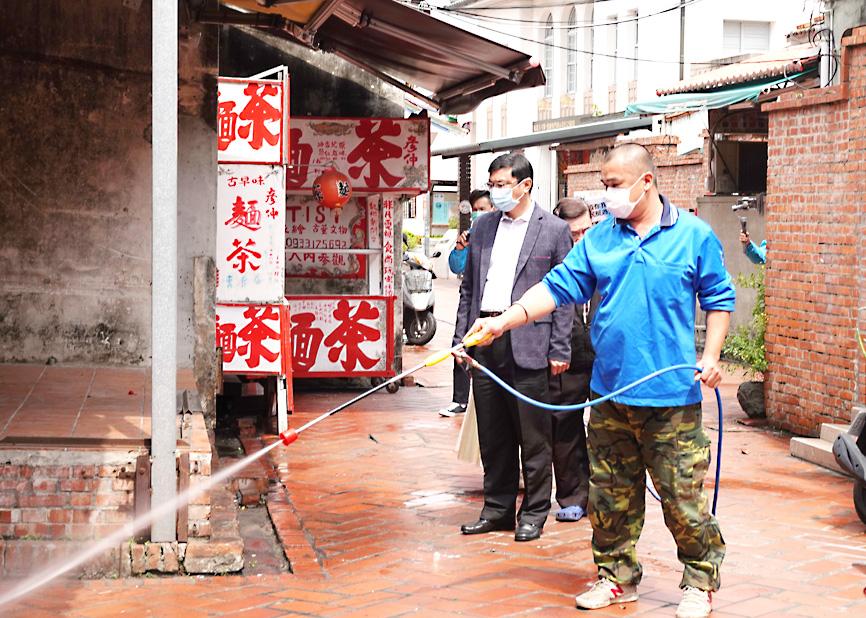Democratic Progressive Party (DPP) Legislator Su Chiao-hui (蘇巧慧) yesterday urged the Ministry of Health and Welfare to issue “guidelines for living” for people to follow on weekends and holidays amid the COVID-19 pandemic.
Speaking to Deputy Minister of Health and Welfare Ho Chi-kung (何啟功) at a meeting of the legislature’s Social Welfare and Environmental Hygiene Committee, Su said that before the Children’s Day and Tomb Sweeping Day holiday from Thursday to Sunday, she had advised the ministry to set guidelines on how people should spend the four-day break.
While the ministry asked people to practice social distancing, it fell short of telling people to stay home during the holiday, she said.

Photo: Tang Shih-ming, Taipei Times
“We had originally looked forward to being able to breathe a sigh of relief after this spring break,” she said.
“Now, not only are we not relieved, everyone is more tense,” she said.
After the Central Epidemic Command Center on Saturday sent two text messages warning people to avoid crowded areas and to follow social distancing regulations — at least 1.5m apart indoors and 1m outdoors — people were “very obedient,” Su said.
Roads became empty the day after the messages were sent, she said.
She said she hoped the ministry would set clearer guidelines on what people should do during the upcoming Labor Day weekend and on weekends, and ask people to try to stay home during the pandemic.
Chinese Nationalist Party (KMT) Legislator Wu Sz-huai (吳斯懷), also a committee member, asked the health ministry to explore the feasibility of working with the Ministry of Education to allow students to pick up their purchases of masks at school.
Many people still have to wait in line to buy masks at pharmacies, Wu said.
With parents at work and children at school, it is often the grandparents who are standing in line, he said.
Ho said while the health ministry would consider the proposal, it might result in the education ministry having to “spend more effort.”
DPP Legislator Hung Sun-han (洪申翰), another committee member, raised the importance of including the homeless population in the fight against the coronavirus.
Homeless people often gather in transportation hubs like Taipei Railway Station — the same places people returning from abroad often pass through — and might be more vulnerable than others to contracting the virus, he said.
They might also be physically weaker due to spending long periods of time outdoors, he said.
He urged the health ministry to help keep homeless people up to date on the latest information about the pandemic and to make washing facilities more accessible to them.

US climber Alex Honnold is to attempt to scale Taipei 101 without a rope and harness in a live Netflix special on Jan. 24, the streaming platform announced on Wednesday. Accounting for the time difference, the two-hour broadcast of Honnold’s climb, called Skyscraper Live, is to air on Jan. 23 in the US, Netflix said in a statement. Honnold, 40, was the first person ever to free solo climb the 900m El Capitan rock formation in Yosemite National Park — a feat that was recorded and later made into the 2018 documentary film Free Solo. Netflix previewed Skyscraper Live in October, after videos

NUMBERS IMBALANCE: More than 4 million Taiwanese have visited China this year, while only about half a million Chinese have visited here Beijing has yet to respond to Taiwan’s requests for negotiation over matters related to the recovery of cross-strait tourism, the Tourism Administration said yesterday. Taiwan’s tourism authority issued the statement after Chinese-language daily the China Times reported yesterday that the government’s policy of banning group tours to China does not stop Taiwanese from visiting the country. As of October, more than 4.2 million had traveled to China this year, exceeding last year. Beijing estimated the number of Taiwanese tourists in China could reach 4.5 million this year. By contrast, only 500,000 Chinese tourists are expected in Taiwan, the report said. The report

Temperatures are forecast to drop steadily as a continental cold air mass moves across Taiwan, with some areas also likely to see heavy rainfall, the Central Weather Administration (CWA) said. From today through early tomorrow, a cold air mass would keep temperatures low across central and northern Taiwan, and the eastern half of Taiwan proper, with isolated brief showers forecast along Keelung’s north coast, Taipei and New Taipei City’s mountainous areas and eastern Taiwan, it said. Lows of 11°C to 15°C are forecast in central and northern Taiwan, Yilan County, and the outlying Kinmen and Lienchiang (Matsu) counties, and 14°C to 17°C

STEERING FAILURE: The first boat of its class is experiencing teething issues as it readies for acceptance by the navy, according to a recent story about rudder failure The Hai Kun (海鯤), the nation’s first locally built submarine, allegedly suffered a total failure of stern hydraulic systems during the second round of sea acceptance trials on June 26, and sailors were forced to manually operate the X-rudder to turn the submarine and return to port, news Web site Mirror Daily reported yesterday. The report said that tugboats following the Hai Kun assisted the submarine in avoiding collisions with other ships due to the X-rudder malfunctioning. At the time of the report, the submarine had completed its trials and was scheduled to begin diving and surfacing tests in shallow areas. The X-rudder,